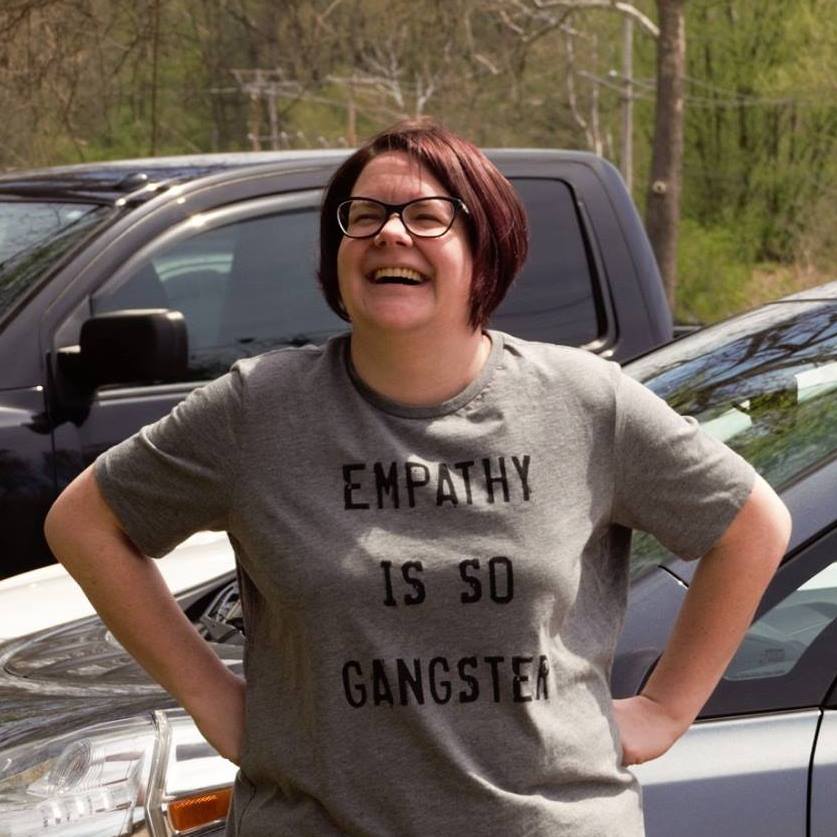
Fourteen years is a long time for anyone to pursue family building but Angie Bergmann hasn’t given up. However, she may decide to stop treatment or make a different choice and she knows that’s OK. On her blog and in her advocacy work she reminds people that the infertility journey is a difficult and expensive path and that everyone has to make decisions that make sense for them.
Angie thinks it’s important to be honest about the disease of infertility — to make it easier to cope with the challenges and to help other people feel more comfortable about sharing their stories.
We talked to Angie about her infertility journey, which has now taken on new urgency; the unexpected upside of her struggles; and the positive impact of infertility support groups and legislation advocacy.
Q: What’s your fertility/infertility story in a nutshell?
Nutshelling 14 years is hard! But here’s my basic elevator pitch: Unexplained infertility diagnosis, as we’re both uber-fertiles on paper, 14 years TTC, one ectopic pregnancy, one miscarriage, one IUI, two IVF retrievals, five embryo transfers, two abdominal surgeries, and a diagnosis of serous cystadenoma with borderline malignancy. The last diagnosis has put a rushed timeline on things, as my cancer risk is 30% when my tumors grow back. I’m in a rush to conceive so I can have a complete radical hysterectomy before I develop ovarian cancer.
Q: What made you decide to document your infertility/miscarriage on your blog, Angie.Life, and other major outlets?
I have a big mouth basically. I’m very much a what-you-see-is-what-you-get type of person and when I started to share my struggle and got more into the community I found out my willingness to share was not common. That a lot of people were either ashamed to talk about it, or were scared because of how people reacted to it. I really don’t care, so I have shamelessly shared since I am able to emotionally deal with it and know we need all the voices we can get.
I tell people all the time to find a support group local to them. There is nothing better than spending time with people that totally get what you are going through.
Q: You have been incredibly active both in supporting others who struggle to build a family via hosting support groups in your hometown and through your federal advocacy efforts. Why is this important to you?
Support groups are so important in this journey. I tell people all the time to find a support group local to them. There is nothing better than spending time with people that totally get what you are going through. The same goes for my federal advocacy efforts, but it’s a level higher there, as it helps me feel some control in an uncontrollable situation. It’s also healing to know that while our efforts may not help me and my friends, it absolutely will help future generations and we can remove the barrier of finances from people building their families.
It’s my story and there is nothing private about it. I have a disease and I need to educate those around me on its impact on my life.
Q: How has being so outspoken about infertility awareness and advocacy helped you cope with this disease?
It’s been healing. I literally had a nervous breakdown before starting to be really open about my struggle. I’ve really embraced the idea that others’ discomfort with my story is their issue, not mine. It’s my story and there is nothing private about it. I have a disease and I need to educate those around me on its impact on my life.
It’s really hurtful how frequently our own community tells us that not continuing is giving up. We don’t all get a fairytale ending and that’s OK.
Q: Although you are still in trenches of treatment, what has been the hardest point of your infertility struggle, and reversely, what is something unexpected that has come from your hardship?
The unexpected side of dealing with infertility is the friendships I have made. While I’d never wish infertility on anyone, I am forever grateful for the best friends this experience has brought me. The people I count as my very best friends are strong women I met while being involved with RESOLVE and Advocacy Day and they have made all of this worth it, no matter my fertility outcome.
The hardest part? Getting passed by everyone I’ve met through the online infertility sphere. Sometimes two and three times over at this point. It’s also hard essentially being the story no one wants to hear about in our community. I feel like I scare people with my story.
Q: Is there anything else you want to add?
Let’s stop with the “never give up” storyline. It really doesn’t help anyone in our community. If someone stops treatment or makes a different choice they didn’t “give up.” Telling us to “keep trying” isn’t helpful or supportive. Emotionally, it’s really hurtful how frequently our own community tells us that not continuing is giving up. We don’t all get a fairytale ending and that’s OK.
